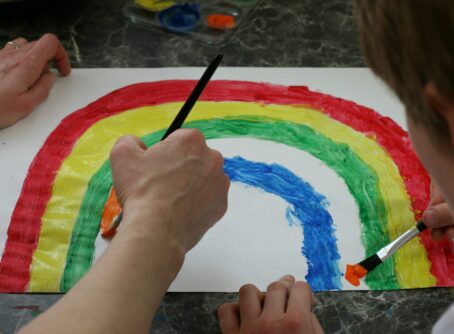Dr. Brianna Lemmons is Assistant Professor of Social Work at Baylor University. Her scholarship focuses, among other topics, on African American fatherhood, the role of non-resident fathers in family life. She is the co-author of a recent examination of son-in-law and father-in-law relationships in Black families. Dr. Lemmons also founded and leads the Black Female Fatherhood Scholars Network which connects female scholars who are committed to uplifting the Black community through the study of Black fatherhood and families. We asked Dr. Lemmons to share a few reflections in advance of Father’s Day.
- What drew you to pursue Black fatherhood as an area of study and teaching?
My interest in Black fatherhood stems from my relationship with my own father. As a child, I bore witness to the challenges that my father experienced in his role as both a resident and a non-resident father, simultaneously. His role as a non-resident father was by far the most challenging one, given the dynamics of his relationship with his co-parent from a previous marriage. Even as a child, I knew my father’s heart and the kind of parent he desired to be, but his circumstances were not such that he was able to meet all of the expectations often associated with the fathering role. He faced many barriers and obstacles that were often overlooked. He, like many non-resident fathers, was misunderstood and assumed to be uncaring and inadequate. But, I knew the reality and truth of his lived experiences. In addition, my father also grew up without his biological father. While he had many great examples of fatherhood–from his grandfather to uncles, mentors, and coaches–he still struggled to make meaning of his own role as a father. His experiences inspired me to do my part in changing the narrative on Black fathers and giving voice to fathers like him. - What is often misunderstood about Black fathers and non-resident fathers, in particular, in the social work field and the culture, at large?
One of things I believe is often misunderstood about Black fathers in general, and non-resident Black fathers, in particular, is the various ways in which they involve themselves with their children. Many of the ways in which they are involved are highly nuanced and often go unnoticed. Though we often try, the involvement of Black fathers with children simply cannot be reduced to numbers. Given the complexity and fluidity of their involvement, the various ways in which they engage with children is highly difficult to measure empirically; existing measurement tools often lack cultural specificity and are not adequate and robust enough to capture the richness of their involvement.
Another thing that is often misunderstood is the flexibility of roles that is often found within Black family structures, which has historically been a source of strength and a means of survival. Across time, the roles within Black families have tended to be highly fluid and adaptive, and thus perceived as inconsistent with the nuclear family structure. Such differences have been characterized by the dominant culture as pathological and deviant. For too long, Black fathers and families have been held to Eurocentric definitions and expectations of family that are not consistent with Black social and cultural norms or reflective of the experiences of Black people across the diaspora. In order to correct these misunderstandings, Black fathers must be given the opportunity to define their role in their own terms. - Mothers’ Day is likely more commonly observed in congregations and family traditions than Fathers’ Day. Whether or not it’s on a particular day, what are some ways that families can practice appreciation for fathers? What are some ways that churches can appreciate fathers?
One way in which families can practice appreciation for fathers is by speaking words of positive affirmation and encouragement over them and consistently reminding them that they matter. So often, fathers are not made aware of the impact that they have on the growth and development of their children and the success of their families. Being verbally reminded of this often (not just on Father’s Day, but everyday) can go a long way in building the confidence that fathers need to persist in their roles. Furthermore, reminding fathers that their contribution to families extends beyond their wallet is also important. Too often, the role of fathers is reduced to financial provision. But, what I’ve learned from my work is that fathers define their role much more broadly than this and that emotional investment also contributes greatly to achieving positive outcomes for children and adolescents.
Furthermore, one of the ways that churches can appreciate fathers is by transforming words into action. There is power within the church that can be leveraged to shift enduring deficit narratives on fathers. The Black church has always been a highly influential institution within the Black community and society at large, which places it in a very unique position to drive social change in this area. In addition, churches can also show support and appreciation for fathers by being intentional about creating spaces for them that are uniquely designed to meet their spiritual needs, which are different from those of mothers. There is a God-ordained call for fathers to lead within their respective homes. Thus, the church has a great role to play in supporting fathers in answering this call.
What two or three books (fiction or nonfiction) would you recommend to readers interested in reflecting on the experience of Black fatherhood in the U.S.?
Engaging and Working with African American Fathers by Latrice S Rollins
Social Work with African American Males by Waldo E Johnson
I have also developed a book and reading list that I’d like to share as well. It can be found here.





